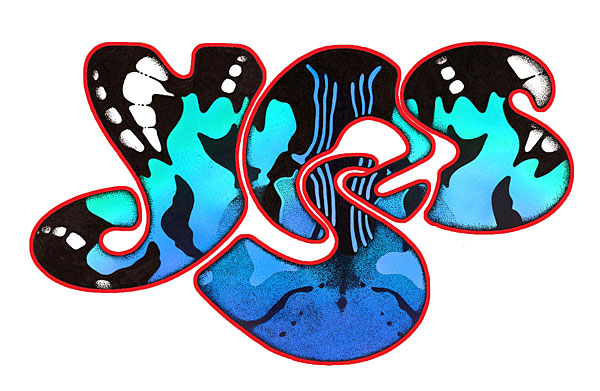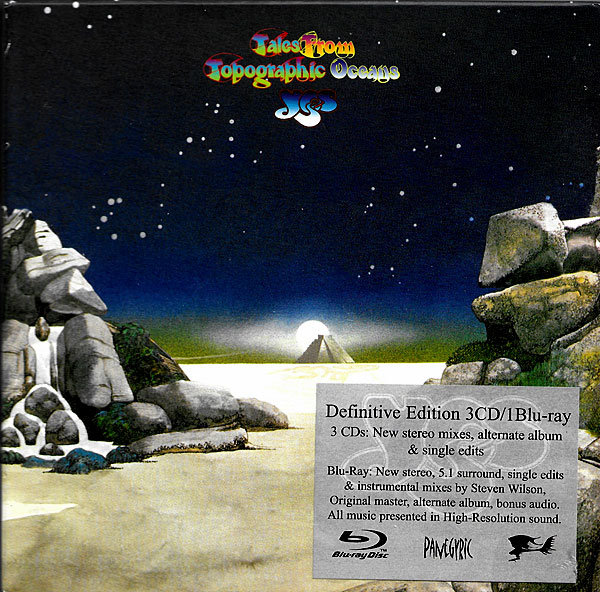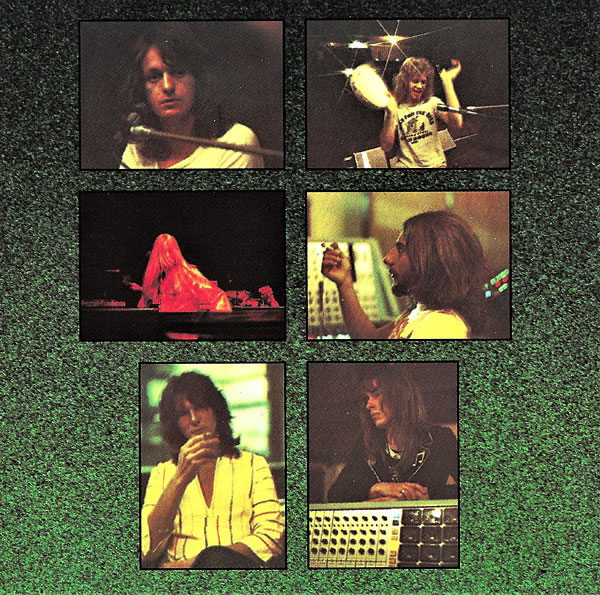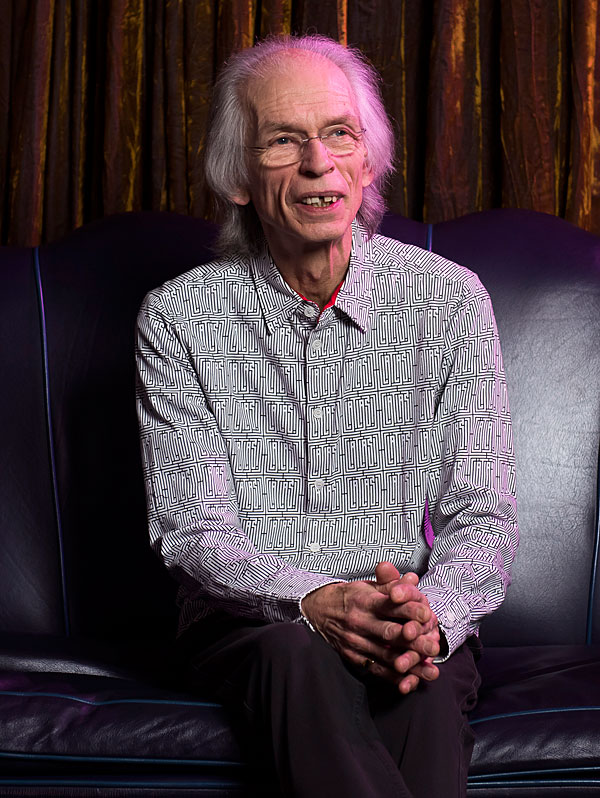Steve Howe, Perpetual Sound Chaser Page 2
A band has a vision, and you collectively agree on what that is. And certainly, that was true of all Yes records made in the '70s—though maybe [September 1978's] Tormato was a bit of a problem because we didn't have a producer, a [separately] named producer. [Tormato bears the credit, "Original Album Produced by YES."] The records that are great are the records that the band and myself put our input into—not just writing and playing it, but actually in the mixing.
I'll give you an example from one of my other bands. On Asia I [i.e., the self-titled Asia, the prog supergroup's first album from March 1982], I was there, and I was able to contribute at the mixing stage—and so was Carl [Palmer, drummer], Geoff [Downes, keyboardist], and John Wetton [bassist/vocalist]. But, you know, the second record [July 1983's Alpha]—I wasn't there. I mean, I made it, and I played on it, but none of us were deemed to be needed during the mix. You know, it was, "Well, Mike Stone's a big producer; he can mix it." Well, he couldn't. He couldn't actually bring that record to where the band had the vision to take it, as great as he was. And I love Mike [who also produced Asia]. I'm not knocking him, but what I'm saying is that it was foolish of us letting go of the mixing of that record. And that's why some of the record I make don't sound like I'm on them! (chuckles heartily)

Mettler: No, and I totally get why you gotta be in the control room for that stage. I think there's a song title for that, by the way. You say you're a "Soundist," but I'd extrapolate that further and say you're a "Sound Chaser." [As noted at the top of this interview, this is a reference to the first song on Side 2 of Yes' November 1974 album, Relayer.]
Howe: (continues chuckling) Well, I dare say, that was one of [original Yes vocalist] Jon Anderson's more lovely titles! And we were all Sound Chasers. We were chasing the sound, and finding that moment. It was very enjoyable getting ready to tour Relayer this year and relearn how to play "Sound Chaser." Well, we were getting there—to be able to play "Sound Chaser" and the other song that ends Side 2, "To Be Over," to go with all of "Gates [of Delirium]."
Mettler: I would love to see you do all of Relayer sometime here in the States. [Note: Due to the pandemic, Yes' eight-date Relayer + Classic Cuts Tour, originally slated for Summer 2020, has since been moved to 2021. Currently, only dates in the UK and Europe have been scheduled for this particular Album Series Tour of theirs.] Well, at least I got to see Yes do the full reading of "The Gates of Delirium" a full year ago when you played Artpark in Lewiston, New York on June 25, 2019.
Howe: Oh, good. It's thrilling to play, and to have gotten that one under our belt. Then we knew we could get to "Sound Chaser" and "To Be Over." If we hadn't learned "Gates" first, we would have been really scared! (laughs) Relayer is a really challenging record, but we'll be ready with it [for next year's tour].
Mettler: Relayer also has a really wonderful 5.1 mix on Blu-ray that Steven Wilson did for you a few years back. Do you have any stories about working directly with Steven in terms of approving or tweaking any of those 5.1 Yes mixes he did?
Howe: Luckily, I was invited there [to his studio] when he was working on [December 1973's Tales From] Topographic Oceans—and I'll tell you an interesting story. But yes, that particular 5.1 is amazing. As a performer on it, I might say that, sometimes, 5.1 is a little bit alarming when you hear the organ coming out of the rear left or something, and then everybody else is over here! (chuckles) There is a kind of disconcerting-ness about it.

I'd like to tell you a story that hasn't been told very often and hasn't been repeated, but I spotted something that was very unusual about it. Well, I spotted two things. One, I explained to Steven that, in fact, his version was going to be a little bit longer on some tracks, because he hadn't noticed that we had edited out a couple of repeats in the songs at the mixing stage. I had to explain to him where they were—that we'd only gone 'round once here, not twice: "You have it twice, but we had it once."
More amazing than that was, when I played the two records together and I compared the tuning of the original and the update, it was perfectly in tune. But in the copies Steven had made, it was slightly sharp by the most incremental amount—I think it was 0.002. His version was sharp by 0.002. Since you're very techie, I think you'll find all of this very interesting.
Mettler: Oh yeah, absolutely I do. I love hearing about this stuff.
Howe: So I got back to Steven and I said, "I'm really alarmed that you're a little sharp!" And he was quickly apologetic: "Well, how did that happen? Where did we go wrong?" I said, "I don't know, but could you varispeed it, or take it back? Because, basically, it is sharp."
And it was. When the song starts, [Howe sings the opening line to Topographic's "The Revealing Science of God"]: "Dawn of light lying between a silence," the other version was, [Howe sings the same line again, only slowed down in tempo a bit; then he chuckles]. It was the most incremental amount, and you'd have to be a musician to have spotted it. But, I am a musician. I spotted it. And I'm very glad that I checked. It was sheer luck that I played them simultaneously, to find this pitch variance in them. It would have been the most unnoticed thing, but I'm glad I went there and found it out.
But back to my first point, about the repeated sections—that was the way Yes wanted it. And let me tell you—Steven Wilson is as vigilant, and attempts to be as vigilant, as he possibly can, and he totally was in the balance of the original mix. There are some things like the snare drum sound in certain areas that are a little different, but he went to every place he could go to, to try to simulate and correctly EQ things so that it didn't sound like a totally different record.
And, mind you, it sounds like a fresher record. It doesn't have the analog tape hiss so much, and some of the ingredients you get [with analog]—some of which are nice, of course, because they're historical. But he did clean it up. And thank you—thank you for giving me the chance to tell that story! (chuckles)
Mettler: Oh, I love learning about the minutiae of mixes like that, so thank you for sharing it with me. Do you have a particular favorite 5.1 mix of those five Yes albums that have been done in surround by Steven to date? I know Fragile came out in a not-so-great version on DVD-Audio in the early 2000s that Steven "fixed," if I can use that word for describing it.
Howe: Oh, Steven straightened Fragile out, because the original 5.1 was dreadful! That one had things like demo guitars and guide guitars on it—and I just don't want to hear that!
But I guess [September 1972's] Close to the Edge is the one I think of first, because Close to the Edge is such a wonderfully recorded record. Eddy [Offord, early Yes producer] was at his peak with us at the time—and we were very much at our peak, because we had the great Bill Bruford on drums. Not to diminish Alan [White's] role, but Bill was obviously the originator of formulating the Yes approach to arrangement. And he took up very little space, but he had incredible impact and an incredible effect on our music, so I will always admire Bill's role. [Alan White replaced Bruford on drums after he left Yes in 1972.]

And, of course, Close to the Edge is one of the best records we made, you know. I'm not into picking out favorites, but if you look at the contour, the continuity, and the tonality of that record, it's remarkable! "Siberian Khatru" is a remarkably individual-sounding track. There's much that I can love about Close to the Edge, so that album in 5.1 is pretty good.
Mettler: It's definitely my favorite Yes album overall. I can also tell you that I recently did a Top 15 list of the Best Surround Sound Music Tracks, and the title track to Close to the Edge is No. 2 on the entire list, because it's that good.
Howe: Well, I'm pleased to hear that! The other day, a friend of mine and I were talking about Yes, and he ended the sentence by saying, "Oh yeah, Yes is definitely the No. 2 band in the world!" (both chuckle) And I thought, "No. 2? I thought he was gonna say No. 1—that Yes is the best band in the world." And then he said, "Well, before you guys, there were The Beatles." (chuckles heartily)
Mettler: I guess you can allow for that, right? Well, one of Steven Wilson's own solo tracks was at No. 1, so you're right up there. Would there be a chance of us getting [July 1977's] Going for the One in 5.1 next? That one hasn't been done yet, and I'm just itching to hear the title track, and "Awaken" especially, in 5.1. Those two songs are perfectly suited for it.
Howe: They would be, yes. But I believe there are issues with getting the multitracks for that album, and the quality of them. The trail had gotten lost on certain songs, and there were issues where the storage facility had most of the tracks but not all of them, or something like that. I can't actually remember what's holding up Going for the One totally, but I believe if it could have been done, it would have been done. And if it can be done in the future, it will be done.
Mettler: Hopefully, that will work itself out at some point. I would also vote for [August 1980's] Drama, especially after I heard you guys play the whole album on one of your recent tours [on the 2016 Albums Tour at Bergen PAC in Englewood, New Jersey on August 10, 2016]. "Tempus Fugit" would be great in 5.1, and so would "Into the Lens"—all of that album, really.

Howe: It would be great, and I'm not sure why Trevor [Horn, the lead vocalist on Drama who has long since become a well-regarded producer] hasn't offered to do that one yet for us, or shown any interest.
I also have to say that "Machine Messiah" [which is also on Drama] would be great in 5.1. It's a song I still go really wild on, onstage—I sometimes can't control myself! I'm not one to jump around like a crazy guitarist, but sometimes, you just want to jump! When we get to the E flat [furiously sings the instrumental line], I go absolutely crazy. I cannot hold myself on the ground because that makes me jump; that makes me bounce. I mean, I wrote it and I love it, and I want to keep playing it. It's such an exciting tune, and it's got everything I love about playing the guitar in it.
You're stirring up some interesting hornets in the hornet's nest here. And it's interesting to go over all of them with you today, because there are a lot of them! When it comes to Yes' career, there are all sorts of things one could do—and I won't give any of them away, but there are things we could do with our past material that would be interesting. But certainly with the other album you've mentioned here, Going for the One, with the marvelous track "Awaken" on there—that would be sensational in 5.1.
Mettler: I totally agree. Both the song "Going for the One" and "Awaken" have such striking opening moments right out of the gate that are just made for 5.1 treatment.
Howe: The way a song starts is very important—and I am noted for my beginnings. Take [Fragile's lead track] "Roundabout," for instance. Great music also ends well, and a great album always ends well. I mean, listen to [The Beatles'] Sgt. Pepper. Listen to [The Beach Boys'] Pet Sounds. All the great albums are strong all the way through. They don't lose it in the end, and that's an important moment.
Mettler: We can close by talking a little more about "Roundabout." I think Steven Wilson totally saved that particular 5.1 mix, since "Roundabout" especially sounded so wrong on the original DVD-A version. You must be ecstatic that we now have "Roundabout" the way it should be in 5.1 because now we get a better way of hearing your iconic intro—which, I don't mind admitting, is one of the few things I can still play on guitar. I've also seen "Roundabout" transcribed maybe five or six different ways over the years, so can you tell me what the real secret is in how to play that intro?
Howe: (laughs) Well, it's in the fingering, and in the way you pull those notes off. Since I don't read music, I can't really condone anybody for writing it down wrong, because I couldn't tell them. I have also seen it transcribed for piano a few different ways too, but that's partly because a pianist cannot interpret or perform it the same way. After the harmonics, you get this part [Howe mouths the second, more noodly part of the "Roundabout" intro]—and you can't really play that on the piano, because I'm pulling off strings; I'm pulling off those notes. There are those delicate intricacies in music that are fairly hard to play—but they give it character, and that's what I'm interested in doing as a guitarist.
It all comes back to that first thing: sound. That's the be-all and end-all of what music is. It's purely sound—and we love it.





























































